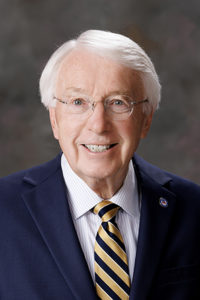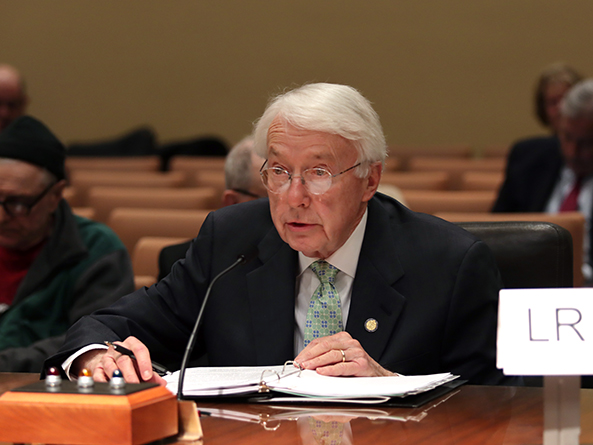Constitutional amendment would end inheritance tax
Nebraska voters could bar the state and any of its political subdivisions from levying an inheritance tax under a proposed amendment to the state constitution heard March 16 by the Revenue Committee.

LR23CA, introduced by Sen. Merv Riepe of Ralston, would place the question on the November 2024 general election ballot.
“There is strong evidence that a majority of Nebraska taxpayers prefer to eliminate this unfair tax and unpredictable source of revenue,” he said. “Why not let them decide?”
Jim Smith testified in support of the measure on behalf of the Platte Institute. He said a recent poll found that 78 percent of Nebraskans favored going farther than LB310, passed by the Legislature last year, which cut inheritance tax rates on beneficiaries and increased the amount of property value that is exempt from the tax.
“LR23CA allows the voters to fully express their opinions on the inheritance tax and by doing so removes the burden on this body to make … what is a very difficult decision,” Smith said.
Doug Kagan of Nebraska Taxpayers for Freedom also testified in support, saying county governments, which collect the tax, sometimes use it for “extraneous expenditures.” He said the inheritance tax acts as a disincentive to accumulate wealth and infringes on a parent’s right to pass on assets to their heirs.
“Those facing death should not suffer additional emotional distress and insecurity about whether their company or estate … will go to their children or close, sell or shrink because of inheritance taxes,” Kagan said.
Bob Hallstrom testified in support of LR23CA on behalf of the Nebraska Federation of Independent Business and the Nebraska Chamber of Commerce and Industry. He said the inheritance tax is unfair because a decedent’s wealth already has been subject to sales, income and property taxes.
Also in support was Richard Clements of Elmwood, who said eliminating the inheritance tax would save time and administrative costs for beneficiaries and counties. He said most counties do not depend on the inheritance tax because it is not a consistent source of revenue.
Testifying in opposition to the proposal was Jon Cannon of the Nebraska Association of County Officials. He said counties often use their inheritance tax funds to pay for large capital projects such as roads and bridges.
Cannon said eliminating the inheritance tax would force counties to increase property taxes, their only other source of revenue, in order to maintain services, something 76 percent of Nebraska voters opposed in a recent NACO survey. Some counties could not make up all the lost revenue because they are at or near their levy limit, he added.
Douglas County finance director Joe Lorenz testified in opposition to LR23CA on behalf of the county. He said Douglas County’s large population makes the inheritance tax a dependable source of revenue that it uses to fund a community mental health center and other essential social services.
If the inheritance tax is eliminated, Lorenz said, Douglas County would have to increase property taxes by nearly 9 percent to make up the lost revenue and maintain its current level of services.
“That would not be received well by our residents,” he said.
Joey Adler Ruane testified in opposition to the measure on behalf of OpenSky Policy Institute. He said large estates often have significant unrealized capital gains on assets like real estate and stocks, which are not taxed until they are sold.
The inheritance tax creates a more equitable tax code by allowing counties to tax those gains to pay for services that benefit all county residents, Adler Ruane said.
Also in opposition was Misty Ahmic, Seward County commissioner. She said the county has used inheritance tax revenue to pay for unexpected expenses such as courthouse elevator repairs and salary increases to hire and retain employees.
The committee took no immediate action on LR23CA.


